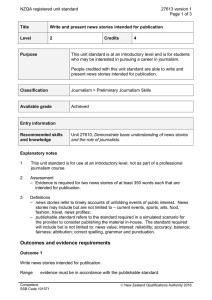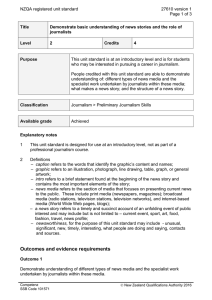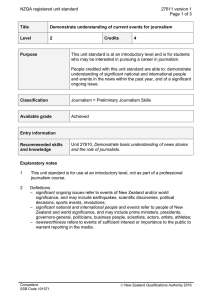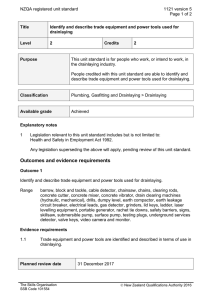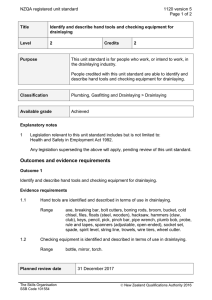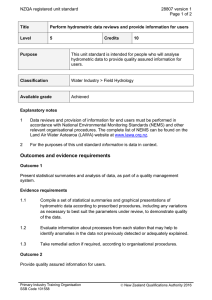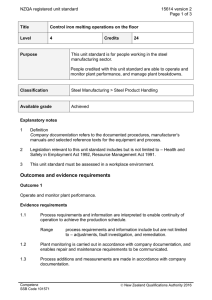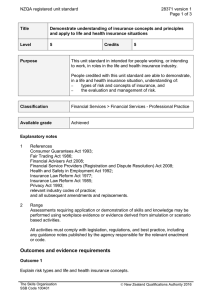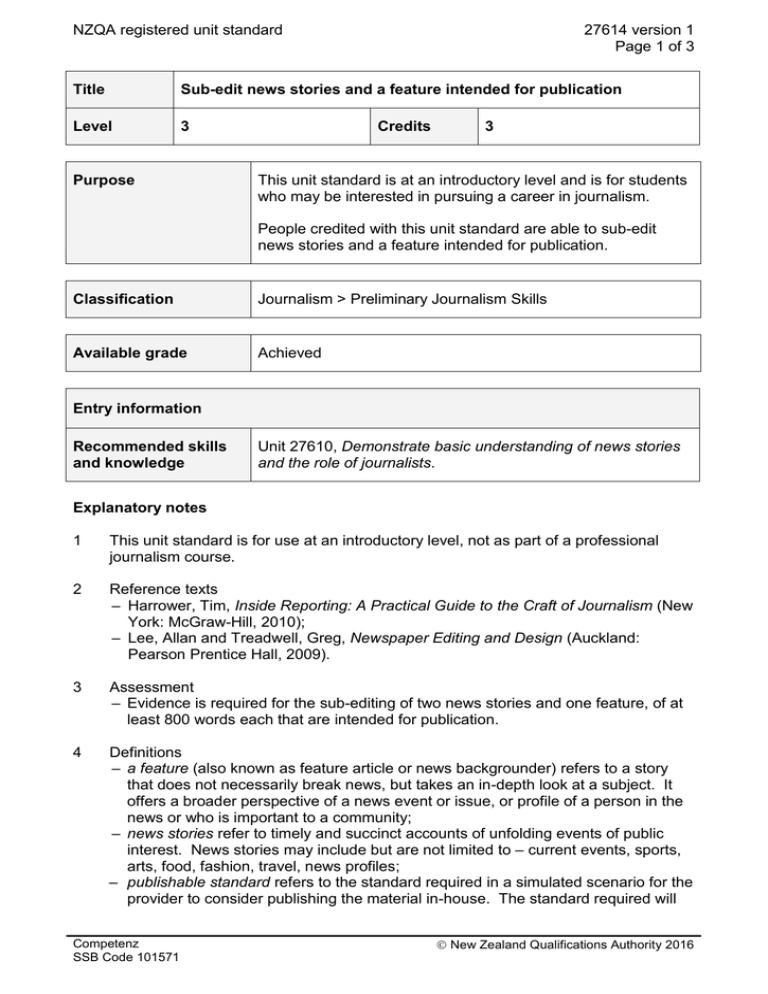
NZQA registered unit standard
27614 version 1
Page 1 of 3
Title
Sub-edit news stories and a feature intended for publication
Level
3
Purpose
Credits
3
This unit standard is at an introductory level and is for students
who may be interested in pursuing a career in journalism.
People credited with this unit standard are able to sub-edit
news stories and a feature intended for publication.
Classification
Journalism > Preliminary Journalism Skills
Available grade
Achieved
Entry information
Recommended skills
and knowledge
Unit 27610, Demonstrate basic understanding of news stories
and the role of journalists.
Explanatory notes
1
This unit standard is for use at an introductory level, not as part of a professional
journalism course.
2
Reference texts
– Harrower, Tim, Inside Reporting: A Practical Guide to the Craft of Journalism (New
York: McGraw-Hill, 2010);
– Lee, Allan and Treadwell, Greg, Newspaper Editing and Design (Auckland:
Pearson Prentice Hall, 2009).
3
Assessment
– Evidence is required for the sub-editing of two news stories and one feature, of at
least 800 words each that are intended for publication.
4
Definitions
– a feature (also known as feature article or news backgrounder) refers to a story
that does not necessarily break news, but takes an in-depth look at a subject. It
offers a broader perspective of a news event or issue, or profile of a person in the
news or who is important to a community;
– news stories refer to timely and succinct accounts of unfolding events of public
interest. News stories may include but are not limited to – current events, sports,
arts, food, fashion, travel, news profiles;
– publishable standard refers to the standard required in a simulated scenario for the
provider to consider publishing the material in-house. The standard required will
Competenz
SSB Code 101571
New Zealand Qualifications Authority 2016
NZQA registered unit standard
27614 version 1
Page 2 of 3
include but is not limited to: news value; interest; reliability; accuracy; balance;
fairness; attribution; correct spelling, grammar and punctuation;
– sub-editing refers to the correcting of spelling, grammar and matters of house
style, and checking stories for accuracy and fairness to meet the requirements for
publication in a school magazine, newspaper or in-house publication.
Outcomes and evidence requirements
Outcome 1
Sub-edit news stories and a feature intended for publication.
Range
evidence is in accordance with the publishable standard.
Evidence requirements
1.1
News stories and feature are sub-edited to meet publication requirements and
common style conventions are consistently applied.
Range
formality of language, capitalisation, numbers, abbreviations,
honorifics, grammar, punctuation.
1.2
Intros are sub-edited to ensure they give impact to news story or feature type
and structure.
1.3
Material gathered for news stories and feature follows a clear and coherent
structure.
1.4
Opinion and fact are clearly differentiated and any errors of fact are corrected.
1.5
News stories and feature are cut to fit the space available.
1.6
Sources of information are recorded.
1.7
Sub-editing ensures that stories and feature are fair, accurate, and balanced.
Replacement information
This unit standard replaced unit standard 10821
Planned review date
31 December 2016
Status information and last date for assessment for superseded versions
Process
Version Date
Last Date for Assessment
Registration
Competenz
SSB Code 101571
1
19 January 2012
N/A
New Zealand Qualifications Authority 2016
NZQA registered unit standard
27614 version 1
Page 3 of 3
Consent and Moderation Requirements (CMR) reference
0002
This CMR can be accessed at http://www.nzqa.govt.nz/framework/search/index.do.
Please note
Providers must be granted consent to assess against standards (accredited) by NZQA,
before they can report credits from assessment against unit standards or deliver courses
of study leading to that assessment.
Industry Training Organisations must be granted consent to assess against standards by
NZQA before they can register credits from assessment against unit standards.
Providers and Industry Training Organisations, which have been granted consent and
which are assessing against unit standards must engage with the moderation system that
applies to those standards.
Requirements for consent to assess and an outline of the moderation system that applies
to this standard are outlined in the Consent and Moderation Requirements (CMR). The
CMR also includes useful information about special requirements for organisations wishing
to develop education and training programmes, such as minimum qualifications for tutors
and assessors, and special resource requirements.
Comments on this unit standard
Please contact Competenz info@competenz.org.nz if you wish to suggest changes to the
content of this unit standard.
Competenz
SSB Code 101571
New Zealand Qualifications Authority 2016

